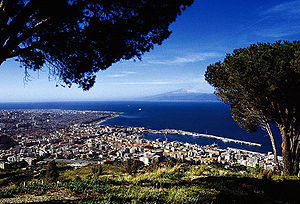 Image via Wikipedia
Image via Wikipedia By:Peter J Flynn
I bought an apartment in Scalea, Calabria, South Italy three years ago and I must say that I am glad I did. Calabria is a very popular tourist destination for Italians from all over Italy, but is relatively unknown to foreigners, Calabria has not received the publicity and investment of the North but it does offer a real opportunity to find the holiday home of your dreams.
A word of warning.
Italy is known for it's red tape but the process of buying property is normally straightforward, the most important thing is the documents for the property. It can be difficult to purchase a property without the proper documentation. Properties are often handed down from generation to generation particularly in the South because as the people of South Italy tend not to move to different areas, the consequence of this is paperwork is not always available and it can be extremely hard to trace the original documents which could date back for generations. My advice is if the documents are not readily available it may be worth considering buying a different property because it could a long time before the documents are found it at all.
That said the buying process usually entails the following.
1. The price is agreed by the buyer and seller
2. There is a document called a compromesso which is the official agreement between the buyer and seller which must be signed by both parties
3. The properties details, including the catastal. The catastal is the rateable value of the property in question, this is what the tax and some of the notary fees are based on. It also states the conclusion date of the deal.
4. The buyer's (all parties who name's will be on the deed) need to obtain a "codice fiscale" personal tax code number. This applies to both parties whether they are Italian of not, no deal can be completed without these details. Registration for foreign buyers is free, you will need your passport when registering for your tax code.
5. You can also open an Italian bank account to transfer funds again you will need your passport for proof of I.D.
6. A date is then set to conclude the deal at the Notary office (a local government official), all funds must be available on this date before contracts are exchanged. The Notary does a check on the property to ensure there are no outstanding debts.
7. The details of the sale will be read out by the Notary in Italian - most agents will provide a translation service (extra fees usually apply).
8. The funds are transferred, then the keys are exchanged
9. The deed will be registered by the Notary and dispatched to the land registry office.
The deed will be registered in the new owners name. A copy is produced, stamped and returned to the Notary's office. This can take up to 6 weeks, you will then have your own copy and the original document is kept at the Notary's office.
Nowadays due to the current economic climate it is much harder to attain mortgages such as in the UK, but in Italy the restrictions are not so severe, and a mortgage can be obtained more easily.
In summary; once you have agreed the price, obtained a tax code, you have had the property checked out by the Notary and all the documents are in place, the monies are transferred and registered - the property is yours!
It is always advisable to seek legal advice before purchasing any property.
I hope you find this useful, having been through this process myself it is pretty painless, good luck.
To see FAQ's about buying property in Italy and finding out more about what South Italy has to offer please visit http://www.placeinitaly.com/property-faqs.html
Article Source: [http://EzineArticles.com/?Buying-Property-in-South-Italy&id=4739767] Buying Property in South Italy
